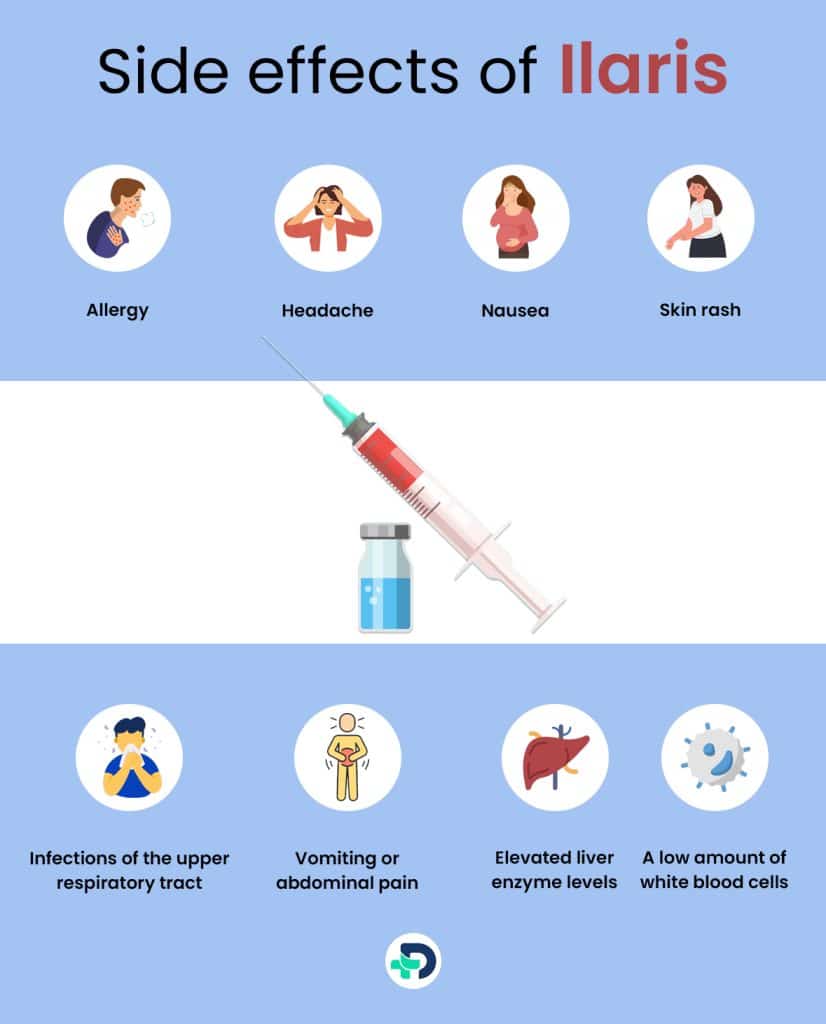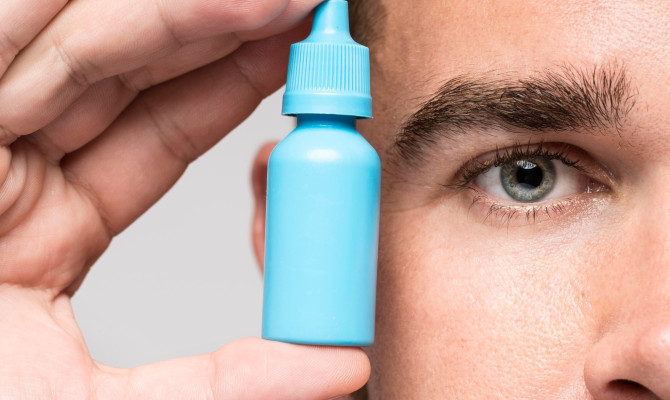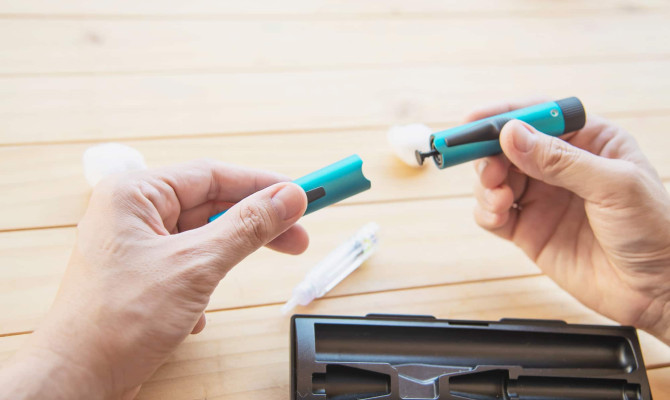Ilaris: Uses, Side effects, and Precautions

- Ilaris
- 22 Aug 2023
Overview
What is Ilaris?
Ilaris is a human monoclonal antibody that precisely targets and neutralizes interleukin one beta, a pro-inflammatory cytokine in the body. Canakinumab is marketed under the trade name Ilaris and is used to treat anti-inflammatory illnesses and reduce inflammation.1Overview| Researched based study from Fda.gov ,2Overview| Researched based study from Nlm.nih.gov
We will examine how this ground-breaking human monoclonal antibody is transforming the lives of patients with rare and crippling inflammatory disorders by giving them a new lease on life in this in-depth article that delves into the fascinating world of and examines its origins, mechanism of action, and the specific medical conditions it targets.

Uses
Ilaris uses
Ilaris commonly prescribed to treat following diseases:
- Cryopyrin-associated periodic syndrome
- Systemic Juvenile Idiopathic Arthritis (SJIA)
- Periodic syndrome associated with the receptor for tumor necrosis factor (TRAPS)
- Still’s disease treatment
Cryopyrin-associated periodic syndrome
- It is mainly used to treat the disorder known as cryopyrin-associated periodic syndrome (CAPS).
- This includes ailments like Muckle-Wells syndrome (MWS) and familial cold auto-inflammatory syndrome (FCAS), which are uncommon inherited auto-inflammatory disorders that frequently cause periods of fever, rash, joint pain, and other symptoms.
Systemic Juvenile Idiopathic Arthritis (SJIA)
- Juvenile idiopathic arthritis in this kind is characterized by systemic inflammation that affects multiple organs and arthritic symptoms.
Periodic syndrome associated with the receptor for tumor necrosis factor (TRAPS)
- It is an autoimmune condition that frequently manifests as fever, cramping in the stomach and muscles, and skin rashes.
Adult on Still’s disease
- It is a rare systemic inflammatory condition mainly affecting young individuals, producing organ involvement, arthritis, high-spiking fever, and rash.
Depending on the ailment being treated, it is often administered subcutaneously (under the skin) or intravenously (straight into a vein). It is typically recommended after other therapies have failed or the patient has not tolerated them.1Uses| Researched based study from Fda.gov ,2Uses| Researched based study from Nlm.nih.gov
Side effects

Ilaris side effects
It can have side effects in certain persons, and the frequency and severity can vary. It’s critical for patients to be informed of potential side effects and to inform their healthcare practitioner of any adverse reactions. Typical negative consequences could be:
Allergy
- Redness, swelling, itching, or discomfort at the injection site are a few examples of reactions.
Headache
- Headache is a side effect that some individuals may suffer while receiving therapy for upper respiratory tract infections.
Infections of the upper respiratory tract
- It might raise the chance of illnesses like the common cold.
Vomiting or abdominal pain
- Gastrointestinal symptoms, including diarrhea or stomach discomfort, can occur in some persons.
Nausea
- Some people may experience nausea or an upset stomach.
A skin rash
- Rashes and hives are examples of reported skin responses.
Elevated liver enzyme levels
- Although uncommon, it may cause increased liver enzymes in some patients.
A low amount of white blood cells
- It might lower white blood cell numbers, making infections more likely.
It’s important to remember that even though the side effects are possible, not every patient will experience them, and some patients may not experience any at all. In addition, the medication is prescribed for a specific set of medical conditions, and its potential benefits in treating these conditions may outweigh the risk of side effects.1Side effects| Researched based study from Fda.gov
Dosage
Ilaris Dosing
The specific medical issue being treated determines the dosage in each location. Depending on the patient’s age, weight, and disease severity, the dosing regimen may alter.
Cryopyrin-associated periodic syndromes (CAPS) in adults and children (four years of age and older)
- Patients who weigh 40 kg or more often receive a starting dose of 150 mg
- Those who weigh less typically receive 2 mg/kg.
- For patients weighing 40 kg or more, the maintenance dose is typically 150 mg every eight weeks, while for patients weighing less than 40 kg.
- The maintenance dose is 2 mg/kg every eight weeks.1Dosage| Researched based study from Fda.gov
Idiopathic systemic juvenile arthritis
- Based on body surface area (BSA), the suggested dosage for pediatric children (2 years and older) is 4 mg/kg for children with a BSA of 0.51 to 1.0 meters square.
- Patients with a BSA, higher than 10 meters square should get 7 mg/kg.
- Typically, the maintenance dose is given every four weeks.1Dosage| Researched based study from Fda.gov
Dose alterations
- The treating physician will decide the dosage for additional disorders based on the patient’s circumstances.
- It is crucial to notify your doctor immediately if you miss a dosage or follow any instructions they may have given you.
- Your medication may not treat your condition as effectively if you skip a dose. Based on your treatment plan and the specific medical issue at hand, your doctor will provide you advice on the best course of action.
- Getting medical assistance immediately if you overdose is essential because doing so increases your risk of experiencing adverse side effects and complications.
- Contact your local emergency services or head to the closest emergency facility immediately if you think you may have taken more medication than prescribed or suffer any strange side effects.1Dosage| Researched based study from Fda.gov
Precautions
Warnings and Precautions
Infections
- There are several warnings and precautions before using it, including infections. Before beginning the medication, tell your doctor if you have any current illnesses or are prone to recurring infections because it can weaken the immune system, increasing the risk of diseases.
Allergy
- Tell your doctor if you experience any energy, especially if you are allergic to a medication or an ingredient in Ilaris medication.
Tuberculosis
- Inform your doctor if you have ever had TB or had close contact with someone who does. It can cause latent TB to reactivate. Therefore, your doctor may test you for it before you begin therapy.
Vaccination
- Liver enzymes may be affected. Your doctor may run routine blood tests to check your liver function while receiving therapy.
Breastfeeding and becoming pregnant
- It is imperative to go over the effects of Ilaris with your doctor if you are pregnant or want to get pregnant.1Precautions| Researched based study from Fda.gov
Drug interactions
Ilaris Drug interactions
Immunosuppressive medications
- Combining it with other immunosuppressive treatments can raise the risk of infections because it increases the immune response, which is how it works.
Interleukin-1 inhibitors
- It may raise the risk of infections or other adverse effects if other medications that decrease interleukin-1 (IL-1) activity, such as anakinra or rilonacept, are taken concurrently.
TNF alpha blockers
- Infection risk may also arise with TNF-alpha (tumor necrosis factor) inhibitors. These should only be used together under extreme caution.1Interactions| Researched based study from Fda.gov
Any feedback on this article?
 This Articles content was accurate
This Articles content was accurate Very Informative Article
Very Informative Article I have a question or a comment
I have a question or a comment
 This article contains inaccurate content
This article contains inaccurate content This article was not helpful
This article was not helpful I have a question or a comment
I have a question or a comment
We appreciate your helpful feedback!
Checkout our social pages





































